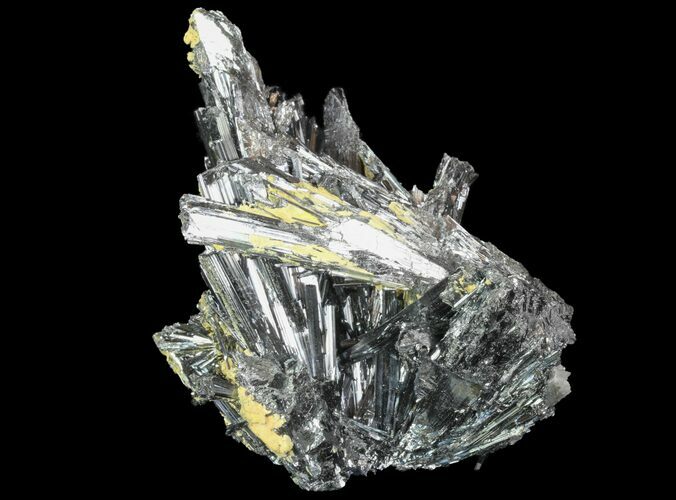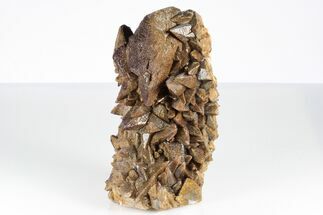This Specimen has been sold.
3.8" Metallic Stibnite Crystal Cluster - China
This is a remarkable cluster of stibnite crystals from the Qinglong Mine in China. The crystals have great metallic luster, fine striations, and are in overall good shape.
About Stibnite
Stibnite is a striking mineral composed of antimony sulfide and is best known for its metallic luster and dramatic, elongated crystal formations. It often forms slender, prismatic crystals that can cluster into stunning radiating or parallel groups. Its color ranges from silvery-gray to steel-blue, with a reflective sheen that enhances its visual appeal. Stibnite is relatively soft, with a Mohs hardness of 2, making it easy to scratch but still prized for its aesthetic qualities.
This mineral has been historically significant as a primary source of antimony, a metal used in alloys, flame retardants, and batteries. Stibnite specimens are highly sought after by collectors due to their unique appearance and rarity. Major localities include China, Japan, and the United States, with some of the finest examples originating from the Wuning Mine in Jiangxi Province, China. Despite its beauty, stibnite contains toxic antimony and should be handled with care.
Toxicity Warning: Stibnite (antimony) is toxic and can be harmful if inhaled or swallowed. Most of the risk is long-term, chronic exposure to its dust. While a crystal sitting on your shelf doesn't pose a health risk, you should wash your hands after handling, keep out of reach of children, and please don't lick the stibnites.
Stibnite is a striking mineral composed of antimony sulfide and is best known for its metallic luster and dramatic, elongated crystal formations. It often forms slender, prismatic crystals that can cluster into stunning radiating or parallel groups. Its color ranges from silvery-gray to steel-blue, with a reflective sheen that enhances its visual appeal. Stibnite is relatively soft, with a Mohs hardness of 2, making it easy to scratch but still prized for its aesthetic qualities.
This mineral has been historically significant as a primary source of antimony, a metal used in alloys, flame retardants, and batteries. Stibnite specimens are highly sought after by collectors due to their unique appearance and rarity. Major localities include China, Japan, and the United States, with some of the finest examples originating from the Wuning Mine in Jiangxi Province, China. Despite its beauty, stibnite contains toxic antimony and should be handled with care.
Toxicity Warning: Stibnite (antimony) is toxic and can be harmful if inhaled or swallowed. Most of the risk is long-term, chronic exposure to its dust. While a crystal sitting on your shelf doesn't pose a health risk, you should wash your hands after handling, keep out of reach of children, and please don't lick the stibnites.
SPECIES
Stibnite
LOCATION
Qinglong Mine, Guizhou Province, China
SIZE
3.8" long, 3.2" wide
CATEGORY
ITEM
#93685
 Reviews
Reviews














